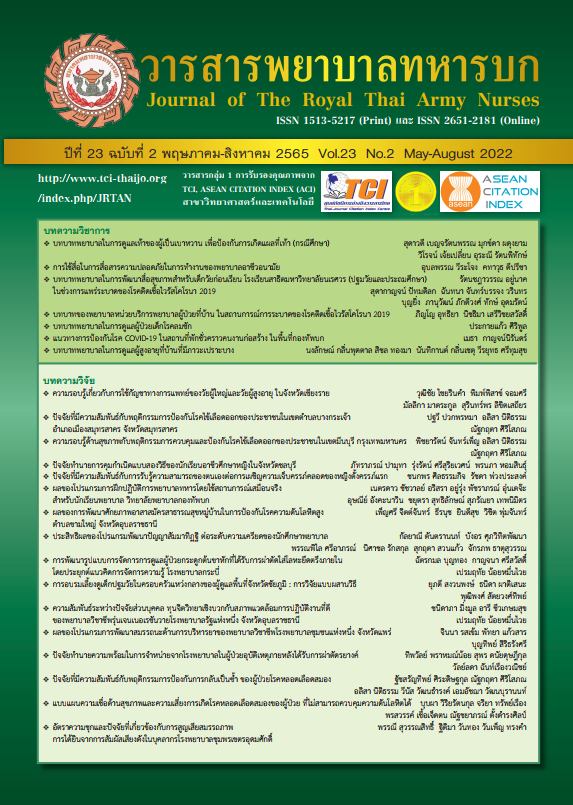The Health Literacy on Cannabis for Medical Use among Adult and Elderly People, Chiang Rai Province
Keywords:
Cannabis for Medical Use, Health Literacy, Adult, AgingAbstract
This research was a cross-sectional study. The objectives of this research are; to study the situation of health literacy on cannabis for medical use among adult and elderly in Chiang Rai province. Method: This research is a study of 463 people. A random sample selected by multi-stage sampling method, collected data by the questionnaire (Cronbach’s alpha coefficiency 0.95). The data were by descriptive statistics, Odds ratio (OR) and Independence t-test. Results: The participants were in adulthood (n = 359) and older adults (n =114). The majority of the adult participants had poor health literacy (68.4%). Most of the older adult participants had poor health literacy (86.8%). The adult participants had a moderately level to very good level of health literacy more than the older adult participants (OR= 3; 95% CI: 1.69-5.48). Most of the adult participants had low health literacy in communication skill and decision skill. Most of older adult participants had low health literacy in Access skill, knowledge skill, media literacy skill, communication skill and decision skill. Conclusion: Most of participants had a low level of health literacy about cannabis for medical use, especially the elderly group. Therefore, program of enhancing health literacy about cannabis for medical use program may be necessary, especially among the older adult.
Downloads
References
Rehm J, Elton-Marshall T, Sornpaisarn B, Manthey J. Medical marijuana. What can we learn from the experiences in Canada, Germany and Thailand? International Journal of Drug Policy. 2019;74:47-51.
Chiu V, Leung J, Hall W, Stjepanović D, Degenhardt L. Public health impacts to date of the legalisation of medical and recreational cannabis use in the USA. Neuropharmacology. 2021;193:108610.
Office of the Narcotics Control Board. Narcotics Prevention and Suppression Action Plan, 2020: Office of the Narcotics Control Board, Thailand.; 2020. (in Thai)
MacCallum CA, Lo LA, Boivin M. “Is medical cannabis safe for my patients?” A practical review of cannabis safety considerations. European journal of internal medicine. 2021.
Arkell TR, Lintzeris N, Mills L, Suraev A, Arnold JC, McGregor IS. Driving-Related Behaviours, Attitudes and Perceptions among Australian Medical Cannabis Users: Results from the CAMS 18-19 Survey. Accident Analysis & Prevention. 2020;148:105784.
Lancaster K, Seear K, Ritter A. Making medicine; producing pleasure: A critical examination of medicinal cannabis policy and law in Victoria, Australia. International Journal of Drug Policy. 2017;49:117-25.
Khampisut J. Health Literacy and Health Promotion Behaviors of Students in Naresuan University. Journal of Educational Measureme nt, Mahasarakham University. 2018;24(1). (in Thai)
Kaewdumheng K. Health Literacy: access, understand and application. Nonthaburi: Amarin Printing and Publishing Public Company Limited; 2018. (in Thai)
A.Flearya S, Joseph P, E.Pappagianopoulos J. Adolescent health literacy and health behaviors: A systematic review. Journal of Adolescence. 2018;62:112-27.
World Health Organization. Health Promotion Glossary. Switzerland 1998.
Kwanmuang Kaewdumheng, and Naramon Triphetsriurai. Health Literacy. Bangkok: Samcharoen Thailand Mall; 2011. (in Thai)
Stewart DW, Adams CE, Cano MA, CorreaFernández, V. L, Y., , Waters AJ, et al. Associations Between Health Literacy and Established Predictors of Smoking Cessation. American journal of public health. 2013;103.
Berkman ND, Sheridan SL, Donahue KE, Halpern DJ, Crotty K. Low health literacy and health outcomes: an updated systematic review. Annals of internal medicine. 2011;155:97–107.
Hoover DS VJ, & Shete S et al.,. Health literacy, smoking, and health indicators in African American adults. J Health Commun. 2015;20.
Levin-Zamir, D. L, D., Gofin R. Media Health Literacy (MHL): development and measurement of the concept among adolescents. Health education research. 2011;26:323–35.
Arnold CL, Davis TC, Berkel HJ, Jackson RH, Nandy I, London S. Smoking status, reading level, and knowledge of tobacco effects among low-income pregnant women. Preventive medicine. 2001;32:313–20
Kittipos Wongnisanatakul. Health Literacy among Diabetic Patients at the Family Practice Center of Phra Nakhon Si Ayutthaya Hospital. Journal of Preventive Medicine Association of Thailand 2018;8. (in Thai)
Ungsinun Intarakamhang. Creating and Developing of Thailand Health Literacy Scales. Bangkok: Health Education Division, Ministry Of Public Health; 2017. (in Thai)
Krejcie RV, Morgan DW. Determining Sample Size for Research Activities. Educational and Psychological Measurement 1970;30:607-10.
Chiangrai Provincial Statistical Office. Statistics report of Chiang Rai Province, 2018. Chiang Rai: Statistical Office; 2019. (in Thai)
Kaphingst KA, Goodman MS, MacMillan WD, Carpenter CR, Griffey RT. Effect of cognitive dysfunction on the relationship between age and health literacy. patient education counseling journal. 2014;95:218–25.
Ganguli M, Hughes TF, Jia Y, Lingler J, Jacobsen E, Chang C-CH. Aging and Functional Health Literacy: A Population-Based Study. The American Journal of Geriatric Psychiatry. 2020.
Caroline N. Harada, Marissa C. Natelson Love, Kristen Triebel. Normal Cognitive Aging. Clinics in Geriatric Medicine. 2013;29:737–52.
Brandt L, Schultes MT, Yanagida T, Maier G, Kollmayer M, Spiel C. Differential associations of health literacy with Austrian adolescents’ tobacco and alcohol use. Public Health. 2019;174:74-82.
Downloads
Published
How to Cite
Issue
Section
License
Copyright (c) 2022 Journal of The Royal Thai Army Nurses

This work is licensed under a Creative Commons Attribution-NonCommercial-NoDerivatives 4.0 International License.
บทความหรือข้อคิดเห็นใดใดที่ปรากฏในวารสารพยาบาลทหารบกเป็นวรรณกรรมของผู้เขียน ซึ่งบรรณาธิการหรือสมาคมพยาบาลทหารบก ไม่จำเป็นต้องเห็นด้วย
บทความที่ได้รับการตีพิมพ์เป็นลิขสิทธิ์ของวารสารพยาบาลทหารบก
The ideas and opinions expressed in the Journal of The Royal Thai Army Nurses are those of the authors and not necessarily those
of the editor or Royal Thai Army Nurses Association.






